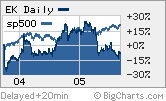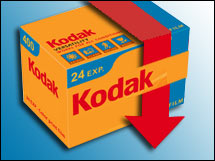 |
| Not a pretty picture: Shares of Eastman Kodak have underperformed the market during the past two years. |
|
 |
| Kodak's traditional film business has been a drag on sales and profits. |
|
|
|
|
|
|
|
NEW YORK (CNN/Money) � Saying goodbye to an American icon isn't easy.
But for investors that are still holding onto shares of struggling photography pioneer Eastman Kodak, it looks like time to let go.
Shares of Kodak (Research) are trading slightly below where they were this time two years ago, just before the company announced that it was slashing its dividend and intended to invest heavily in the digital-photography and medical-imaging businesses.
While the company has made an admirable attempt at righting itself, investors are still waiting for signs of a consistent turnaround.
Although earnings per share did increase by 13 percent in 2004, that followed a 15 percent decline in profits in 2003. This year, analysts expect a 25 percent decrease in profits.
In July, after the company reported second-quarter earnings that missed Wall Street's forecasts by a mile, the company announced that it would no longer give earnings guidance to Wall Street.
Kodak also said that it planned to cut up to 25,000 jobs by the middle of 2007, up from its original projection of 15,000 reductions announced in January 2004.
But analysts say it may be too little too late for the company. That's led to some takeover rumors during the past few months. The most frequently mentioned suitor has Hewlett-Packard (Research).
And on investing message boards, some even more fanciful scenarios are being discussed, such as a takeover of Kodak by Fuji (Research) or Samsung and even Xerox.
"Kodak could be a good fit for the right buyer. They have a brand name with consumers that is valuable and from a valuation standpoint, the stock is not overly expensive," said Jamelah Leddy, an analyst with McAdams Wright Ragen.
Don't believe the takeover hype
Problem is, many other analysts think there's little merit to any of the takeover speculation.
"I don't see a strategic buyer. It doesn't make sense for HP to buy Kodak," said Shannon Cross, an analyst with Cross Research, an independent research firm.
Any big acquisition by HP would be a major surprise since new CEO Mark Hurd is in the process of cost-cutting and cleaning up the mess created by HP's merger with Compaq in 2002.
And other competitors probably wouldn't be interested in Kodak either.
That's because Kodak, despite success in catching up in the digital-photography market, is continuing to see sales of traditional film products decline. Sales in that business, which accounted for nearly 40 percent of total sales in the second quarter, plunged 23 percent.
"Kodak is doing better than they were three years ago but film is like the buggy whip. Kodak was slow to realize that," said Harriet Baldwin, an analyst with Soleil � Palladian Research, an independent research firm.
What's more, the digital-photography market, particularly for consumers, is extremely competitive, with Sony (Research), Canon (Research) and others helping to create a tough pricing environment.
So even though Kodak was the No. 1 maker of digital cameras in the United States, with a market share of 23.8 percent in the second quarter, according to IDC, this hasn't translated into a financial boon for the company.
Second-quarter operating earnings in Kodak's film division, which also includes the traditional film business, were down 16 percent from a year earlier.
"Kodak has done a better job of producing more digital cameras for people to choose from but do you want to win the market share race or the profitability race? Most investors would rather have profits," said Baldwin.
And Cross sees little to be optimistic about in Kodak's other two major businesses, graphic communications (basically commercial printers) and medical imaging.
She said more restructuring needs to be done in the printing business and that on the healthcare side, Kodak needs to also become a bigger player in digital imaging as hospitals rely less on traditional X-rays.
"Kodak is facing a situation where profitability depends on businesses that are declining," Cross said.
What's more, Cross said that Kodak may have a tougher time becoming a major player in the digital-medical imaging business since it is competing against much larger rivals such as General Electric (Research), Siemens (Research) and Toshiba (Research).
With all that in mind, investors probably should not get suckered into buying the stock...even if takeover rumors crop up again.
Baldwin said she doesn't believe that management is shopping the company. But she added that if the Kodak's troubles persist, eventually it might make sense for a private equity firm to takeover Kodak and split the company up.
But Cross doesn't think that buyout firms, which typically finance transactions with debt, would be interested in the near-term because of Kodak's balance sheet woes. The company had about $3.7 billion in debt and just $553 million in cash at the end of the second quarter.
In other words, it's not time for investors to share in this Kodak moment.
For more on personal technology, click here.
For more about why Kodak was thrown out of the Dow last year, click here.
McAdams Wright Ragen's Leddy owns shares of Kodak but heir firm has no investment banking relationships with the company. Other analysts quoted do not own shares of Kodak and their firms have no investment banking relationships with the company.
Sign up to receive the Tech Biz column by e-mail.
Plus, see more tech commentary and get the latest tech news.

|